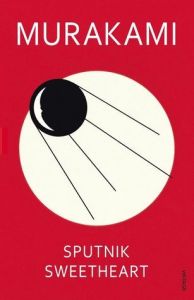 Sputnik Sweetheart by Haruki Murakami
Sputnik Sweetheart by Haruki Murakami
Published: 2002 by Vintage
Genre(s): Fiction, Magical Realism, Asian Literature
Pages: 229
Format: Paperback
ISBN: 9780099448471
Goodreads
Amazon

As a long-time reader of Murakami (A Wild Sheep Chase; Norwegian Wood; Dance, Dance, Dance; The Elephant Vanishes; Samsa in Love; Kafka on the Shore; The Strange Library; South of the Border, West of the Sun; The Girl from Ipanema 1963/1982; and The Vampire Cabbie), reading Sputnik Sweetheart is like slipping back into the comfort of a warm home after a long day out in the biting cold. In other words, Sputnik Sweetheart is familiar—a welcoming sort of familiar for me.
K is your typical Murakami protagonist. He’s your average man—though, he sleeps with women who already have partners and is perhaps more lonely than what the ‘average man’ is usually defined as—with a way of life that he sticks to. However, in a way, he’s not really the protagonist because Sputnik Sweetheart is actually about Sumire. She’s seen through K’s eyes, thus it’d be more fitting to say that K is the medium, particularly since (as alluded in the first chapter) he’s aware that the main subject here is Sumire. Sure, K goes through his own conflicts. He acts on his own too, but everything goes back to Sumire in the end.
On the other hand, the basic plot is your typical Murakami plot as well. Here, we have a guy in love with an ordinary girl who turns out to be not ordinary and somehow vanishes into thin air. Does this ring any bells? Well, here’s a hint: the unnamed protagonist’s lover who disappeared without a trace from A Wild Sheep Chase/Dance, Dance, Dance. So yeah, if you’ve read a couple of Murakami books already, Sputnik Sweetheart would sound the same as them. Though, I’d argue that what’s important here is the emotions. I’ve never gotten the exact feelings I’ve gotten from reading Murakami’s works, from other authors, and this unique feeling alone is enough to keep my usual ‘Ugh, another cliché/trope/recycled idea’ self at bay.
Even so, Sputnik Sweetheart doesn’t shine as brilliantly as the previous Murakami novels I’ve read. I was pleasantly surprised by the ending, and I really like the metaphor of three people—one who has a unrequited love, one who is incapable of feeling love, and one who was incapable of feeling love but later gains an unrequited love—orbiting in space like satellites that can never touch. But, there’s just something missing from this book. Maybe it’s the lack of the Sheep Man, or talking cats. Maybe it’s the feeling that Sputnik Sweetheart is somehow straddling the lines between the two categories of Murakami’s novels despite it clearly belonging in the category where the surreal mostly hides underneath a gloomy, mundane surface. I can’t put my finger on what exact thing is missing, but I can’t shake that feeling either.
Like South of the Border, West of the Sun, Sputnik Sweetheart is a enjoyable and quick read. It’s a good introduction to the world of Murakami so if you’re a new reader, I suggest you read this or SotBWotS first.

| BOOKSTAGRAM | GOODREADS | SIX WORD MEMOIRS|

